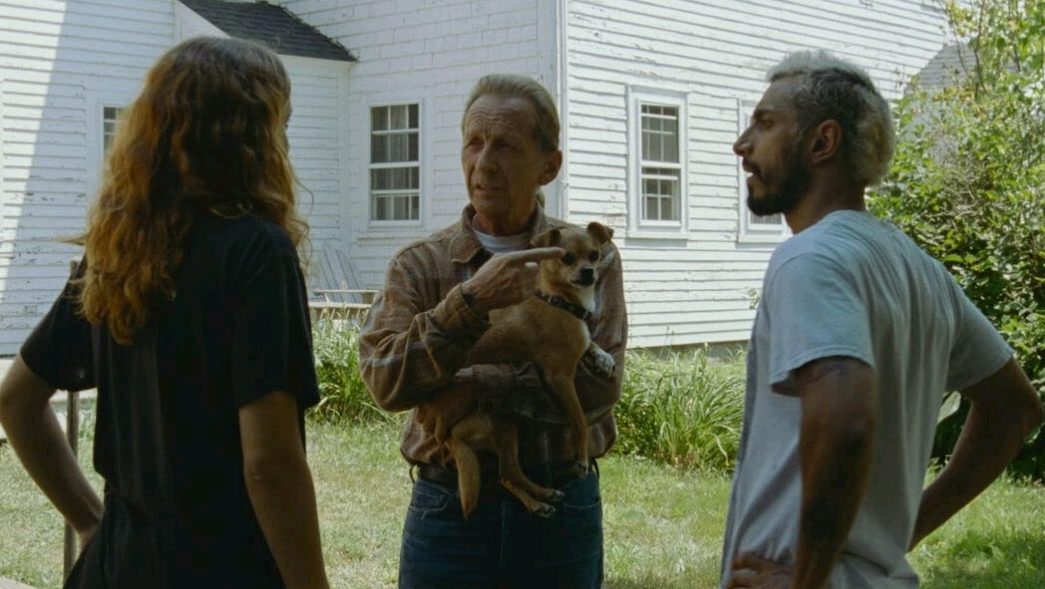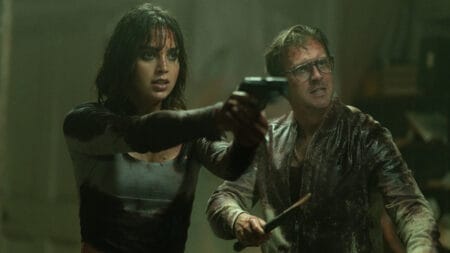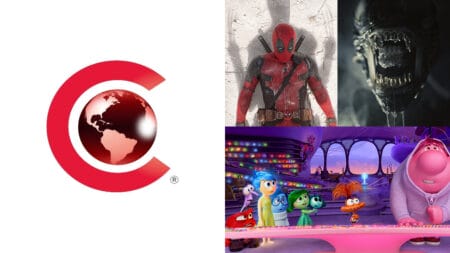In the midst of a whirlwind Oscar race, there’s one underdog that’s been making quite the mark. Indie darling, Sound of Metal is writer-director Darius Marder’s fictional feature debut. Following the story of a heavy-metal drummer who goes on a downward spiral as he loses his hearing, Paul Raci shines as a Joe, a deafened alcohol counselor to the newly deafened Ruben (Riz Ahmed). The two actors quickly become some of the most crucial collaborators in Marder’s film. On top of Raci being “a life-long member of the deaf community with insight into the film’s exploration of addiction, Ahmed’s dedication to drumming and American Sign Language lessons brought an additional level of authenticity.”
Raci has been acting for over 40 years, usually as a day player in shows like Parks and Recreation. A diamond of an actor hiding in plain sight until cast for his unique upbringing, in what seems to be the opportunity of a lifetime. Growing up as the son of deaf parents with deep roots in rock and roll, there is possibly no one else who could understand this role to its truest core. And after an unprecedented awards season, Raci is getting the recognition he deserves.
Nominated for Best Supporting Actor, he stands tall next to the other phenomenal performances from Daniel Kaulyya, LaKeith Stanfield, Leslie Odom Jr., and Sacha Bara Cohen. Before the big night, we had the pleasure of sitting down with him for an exclusive interview. We talk his fan-driven Oscar campaign, his experiences as a C.O.D.A (Child of Deaf Adults), and what’s next not only for him but for deaf representation on film.

First off, we have to give you a huge congratulations on your nomination. It was such a pleasant surprise because a lot of fans were campaigning for you online. How did you feel when you found out that you got nominated for Best Supporting Actor?
Paul Raci: Oh, it’s beautiful. I’ve been trying to stay away from social media and the hype, but sometimes you can’t help it. I was really gratified to see so many people, kind of a groundswell for the guy that has no name – that would be me. You know, overnight success after 40 years. But it was wonderful that the morning of the nominations, for some reason I overslept. I don’t have an alarm clock, I have a head clock and the head clock was turned off. We got up late, ran into the living room, turned on the TV, and just barely caught the young lady saying my name. So then pandemonium hit because my neighbors were all up. It’s 5:30 in the morning and they brought champagne over.
Was your daughter home for the news?
Paul Raci: Yeah she was home. My wife was crying. My daughter was hysterical. It was just a big party, just a wonderful surprise. I didn’t really expect it because, again, if you’re paying attention to social media, “Paul Raci is out! He’s back! He’s out again!” And so it finally happened. So that was wonderful.
It’s very funny how the award season plays out in general. “Oh, you’re in again because you got this BAFTA or Critics Choice or whatever.”
Paul Raci: Right from the beginning though, months ago, when the movie first came out, I was told by a couple people, “It’s a great performance, but don’t expect too much because you’re really a nobody.” So that’s a nice way of putting it yeah? (laughs)
Especially when you’re like, “But this is my big break!”
Paul Raci: Oh,my god. Exactly. But you know, you really can’t pay attention to either side, positive or negative. You just got to keep moving forward, and hopefully, keep your head down and keep working.
Exactly. Looking back now, how did you feel like your experiences led you into this role? And what influences did you bring to Joe?
Paul Raci: Reading the script, I was immediately struck by how many of the experiences that Joe had were similar to mine. In the original script, he was an Iraq War veteran. My war was Vietnam. I had two tours to Vietnam and when I came back, I picked up some nasty habits, some addiction, things that I had to work through. Eventually, when I became a sign language interpreter, I was following Deaf addicts through their experience in hearing programs with hearing addicts, and I’m shadowing these guys through the whole experience. Then later on, I started running a deaf ministry at a church that I was going to in Los Angeles. So with all these things, I’m thinking to myself, “Wow, I know this Joe guy.”
But the thing that really nailed it for me was his spiritual philosophy, which my spiritual philosophy is kind of morphed into, if you will. From being a Roman Catholic growing up in the south side of Chicago, being an altar boy in Roman Catholicism, and then coming [to Los Angeles] and shifting into a Buddhist mindset. When Joe has that final meeting and tells Ruben, “The kingdom of God is right here.” You know, praying to a god that’s “out there.” That’s not how I really do it anymore. It’s here where there is a oneness in all of creation. So that’s where I thought, “God, this Joe guy sounds like me.”
It’s crazy how your two stories have lined up and it’s awesome that you were able to really bring this role to life. With this film also being in development for so long, how was that experience when you first joined?
Paul Raci: Well, [Darius Marder] had been writing it for about 14 years, talking to deaf people from across the country and getting feedback, trying to flatten out his learning curve. It’s interesting for me because for the last 14 years, he’s been writing this thing and I’ve just been doing my work. I’ve been in ministries, I’ve been doing stage acting out here in 99-seat theater houses like Deaf West Theatre, paying for a college education for my daughter, I put her through music school, and being a sign language interpreter in the court system.
So I’m just doing my thing, he’s doing his thing. There’s Paul Raci “struggling actor” just doing his thing, but how perfect the timing was… it was like serendipitous. I get the script and read it. Me and Darius, we meet at the right moment, things can only be so perfect. I really can’t complain about not having been a “successful” star after 40 years because this is too perfect. I kind of prefer it this way.
What do you think is next for you now?
Paul Raci: Well, I don’t really know right now, because we’ve been offered a bunch of scripts, a lot of them we’ve turned down. But we have three or four very interesting scripts that I’m looking at right now, we’re trying to weigh them against each other, and also figure out if the timing is going to be right to do these things. But believe me, there are some wonderful things in the very near future that I will be doing, possibly in May or June. So that’s been a wonderful change.

You know, in the old days, if somebody came along with a role that was a one liner or a one day player role, I would take it of course. Because it meant trying to get my health insurance back to kick in or just to do something for some money. Well, those days are gone because I’m getting some very serious offers and some very serious scripts, some meaty characters. It’s just perfect to be able to take a deep breath and read some things that are really worthwhile. Hopefully, they’re all going to come to fruition very soon. I’m trying just to take in the gratitude, and at this point of my life at this age, it’s just beautiful.
Touching on deaf representation, your Sound of Metal co-star Lauren Ridloff is going to play Marvel’s first deaf superhero in a movie called Eternals later this year. Going from this, what do you hope for deaf representation in the future?
Paul Raci: Now is a really good moment. See, this has happened a few times along the last couple of 30 years, where there’s been a deaf breakthrough, like Children of a Lesser God in 1986 and all these things. Then somebody drops the ball, and you never hear from deaf actors again. I think it might be a little bit different now. Sound of Metal showing a deaf sober house – deaf addicts – a refreshing look at people that you think you know, but you really don’t know. Lauren Ridloff is going to be a superhero now in [Eternals], I think it’s going to be a little different.
We’re going to see more and more deaf protagonists on a journey that you’re watching on the screen, but they just happen to be deaf. So to normalize that in our society right now is a wonderful thing. Normal, but not exactly normal, it’s just like an expansion of awareness, expansion of consciousness and inclusion, which is so cool. My parents growing up in the 50s in Chicago, I noticed and I was told many times by people in deaf culture, and my family growing up there, how they just felt excluded from pop culture. There was no captioning on movies, no captioning on television, no devices to text each other with, no sign language interpreting profession.
That didn’t happen yet and when I got back from Vietnam, then it started happening. I started realizing where you could actually be a sign language interpreter, rather than somebody’s kid, you know, as a little boy, I’m negotiating a mortgage between the bank [and my parents] and I’m like, what the heck am I doing here? What am I talking about? What do you mean interest? On a car? Yes I’m interested in the car, or I don’t know what I’m talking about, as an interpreter. So it’s different nowadays. If you were born before 1980, though, you were thrown into those situations. But now to have this breakthrough, it really is an inclusionary move. And I’m so grateful to think that it’s going to be a little more inclusionary in the future.
I can’t imagine what it was like growing up then, where none of these things existed for the deaf community. And we can only hope things will get better. What do you think your parents reaction would be if they saw Sound of Metal?
Paul Raci: My mother was in love with movies. I think they would have been very proud. I sure do wish that they could have seen this because of the deaf ensemble in the sober house, that middle part of the movie is just beautiful.
Right, like those scenes where they’re playing the drums and getting all the beats right on time.
Paul Raci: Isn’t that cool? The way they bring the character of Ruben, he’s lost his hearing and he doesn’t want to drum anymore. He tells me the first day, “No, I don’t do music anymore.” And then they have that scene… how can you not be touched by that? For god’s sake.
It’s beautiful, like what else can you say?
Paul Raci: You can’t say anything. You have to feel it. And again, you look on Twitter and somebody goes, “I don’t get it. I don’t get that movie.” Then you know what, you are heartless! (laughs)
It’s so silly with strangers, I get into Twitter fights all the time and I’m like… do they have any empathy?
Paul Raci: Me too! I have to restrain myself. That’s on everything and every political level, this level, that level – I find myself getting into a fight. I’m a nice guy, you know, I don’t want to fight with you! So I just disengage. But yeah, that is so true.
Yeah, you just always feel a lack of empathy in those situations.
Paul Raci: When you’re ready, you’re ready. Once you experience something like that, then you can’t go back to your old way of thinking. Once there’s a breakthrough for you inside, you have a moment of empathy. And you can be any age, I find myself arguing with guys my age, I’m in my 70s now, and I get into these stupid arguments like dude, if you haven’t hit that point of empathy by now, then I’m just gonna say goodbye and have a nice life.


Speaking of audiences online, what do you hope is the takeaway from all of this?
Paul Raci: Oh, there’s so much. I would hope that people looking at this would see how cool it can be when you intersect cultures. Sometimes you go, “Oh, my god, I didn’t know that. Nor have I ever thought of that.” So that’s cool. The other thing too, I know a lot of musicians in Los Angeles, that it’s a scary thing to watch this movie. They don’t want to watch it. It’s too close to home because losing your hearing is… we’ll take it a step further, what about losing your sight? What about all these things, you know? So protect your ears.
I know young people like to go to loud rock concerts. I’ve been doing that my whole life, but I have to protect my ears now. I still have tinnitus from when I was on the ship in Vietnam, I worked on a flight deck with jet airplanes. So you have that ringing in your ears. Now that I play in a lot of rock concerts with my band, I get that ringing – you don’t want that because you don’t know when it’s going to go away. So talking about the takeaway from the movie, protect your ears because it’s really sensitive, it’s precious.
Above all, the intersectionality of cultures and learning from each other, I just love that there’s so much that hearing people can learn from deaf culture. Things that we can be sensitized to as far as what blind people are going through in this world, deaf blind people as well. There’s so much that you can be sensitized to and that’s what I think is the big takeaway. People are people, people are having their journeys, and to walk in another man shoes can be a beautiful thing.




